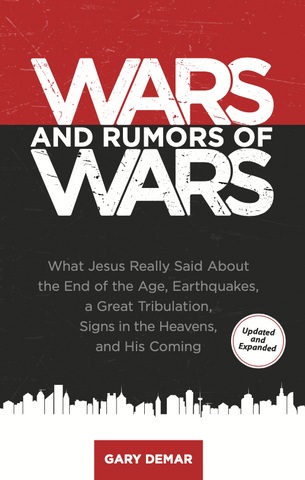Gary interviews author Brian Godawa about his new book, Israel in Bible Prophecy: The New Testament Fulfillment of the Promise to Abraham.
If Israel and Judah’s distress was so great that there was “none like it,” then how could a future tribulation be greater? In order to get around this interpretive problem, futurists claim that “Jacob’s distress” is a yet future great tribulation. But the context of Jeremiah’s prophecy says otherwise since it is describing the nation’s captivity under the powers of Jeremiah’s day.
As Jesus describes it, the horror associated with the destruction of the first temple would be multiplied in the destruction of the second temple and all that it stood for since the sin was greater, they had “crucified the Lord of glory” (1 Cor. 2:8) and disowned their Savior “in the presence of Pilate (Acts 3:13):
It is not needful to go beyond the Prophet Ezekiel to find the sad fulfillment of these dire threatenings. The book of Lamentations (4:10) reveals how literally these predictions were realized, when parents ate their children,[1] the conditions of siege driving them to cannibalism. And the added word was given that the sons would eat their fathers. Human plight can know no greater depths.[2]
R. H. Charles comments that the phrase in Matthew 24:21 “is a stock eschatological expression. It is first found in Dan. xii.1; then in 1 Macc. ix.27; next in Ass. Mos. viii. 1, and subsequently in Rev. xvi. 18.”[3] Contrary to Charles, the phrase is used earlier than its appearance in Daniel 12:1. His point, however, that the phrase “is a stock eschatological expression” is valid. The fact that the events described in Matthew 24:1-33 were to take place before that generation passed away should be enough for any Christian to believe that the destruction of Jerusalem in AD 70 was the most catastrophic judgment the city of Jerusalem ever experienced or will experience. The wording of Matthew 24:21 is an intentional exaggeration of language to emphasize the horror and uniqueness of Jerusalem’s judgment.

Wars and Rumors of Wars
A first-century interpretation of the Olivet Discourse was once common in commentaries and narrative-style books that describe the fall of Jerusalem in AD 70. There is also a history of skeptics who turn to Bible prophecy and claim Jesus was wrong about the timing of His coming at “the end of the age” and the signs associated with it. A mountain of scholarship shows that the prophecy given by Jesus was fulfilled in exacting detail when He said it would: before the generation of those to whom He was speaking passed away.
Buy NowGary interviews author Brian Godawa about his new book, Israel in Bible Prophecy: The New Testament Fulfillment of the Promise to Abraham. Like Gary, Brian believes that Israel’s modern role on the world stage has no significance to Bible prophecy and the “end times.” Too many Christians blindly support everything Israel says and does because of this belief. As Brian puts it: “Anti-Zionist does not mean Anti-Semitic.”
Click here for today’s episode
Click here to browse all episodes of The Gary DeMar Podcast
[1] “The hands of compassionate women boiled their own children; they became food for them because of the destruction of the daughter of my people” (Lam. 4:10; also Lev. 26:29; Deut. 28:57; 2 Kings 6:24-30; Jer. 19:9; Lam. 2:20; Ezek. 5:10).
[2] Charles Lee Feinberg, The Prophecy of Ezekiel: The Glory of the Lord (Chicago: Moody Press, 1969), 38.
[3] R. H. Charles, A Critical History of the Doctrine of a Future Life in Israel, in Judaism, and in Christianity or Hebrew, Jewish, and Christian Eschatology from Pre-Prophetic Times till the Close of the New Testament Canon (London: Adam and Charles Black, 1899), 329, note 1.

